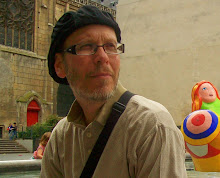"I wrote again today. It's still going well.
"I tried to get my sister, L--, to run with me today. She wouldn't....D--, one of the city truck drivers at the A.J. [newspaper], and I still discuss running. He's having problems with his feet, so he had to cut down on his running. He was running 4 or 5 miles. Now he's only running two."
MANHOOD REDO: There was an article in The Washington Post Magazine this weekend about the debilitating life of many retired NFL football players. It primarily focused on Dave Pear, who played as a defensive lineman for Tampa Bay and Oakland some years back, and now in his 50s he is unemployable because of both chronic pain and memory loss attributable to all the hits he took as a young man on the field. When I was around Joe Ehrmann, who played for the Baltimore Colts in the 70s, he talked to another former pro player about hip replacement surgery as if it were a given. Also, apparently for pros who suffered a number of concussions, dementia is not uncommon.
While football players might not seem to have much to do with D-- and his foot problems, the two are strongly connected for me. Instead of stopping his running regimen to give his feet time to heal, D-- cut his running distance in half. As men, we're not supposed to let pain get in our way. It's a badge of honor to overcome it, push it face first into the ground. The greatest competitors are those who can play hurt or sick, like Jordan with the flu against Utah during game five of the NBA finals. They gain legendary status by overcoming the limitations of ordinary men and women. It's the closest men can come to being supermen, to appearing invulnerable.
When I played basketball in high school during my junior year, I came down sick with the flu and didn't practice for a week. When I returned, I went through a two hour practice, and afterwards, coach asked me if I wanted to play in the JV game that evening (I was on varsity but JV was short of players that night) and I said okay. Everyone went around saying, "All right, McGann is playing with us," which boosted my energy - until gametime. I started as a forward, but the game moved way too fast or I moved too slow. The ball would make its way to one end of the court and by the time I reached that end, it was headed the other way, so I would turn around, but when I reached the far side, everyone was running past me in the opposite direction. This went on four or five minutes until I finally walked off the court, completely exhausted. Coach was mad when I explained I couldn't keep up because I guessed I wasn't strong enough yet after being sick and said I should always tell him when I'm not up to playing. He knew, though, I'd had the flu and it was my first day back, and he hadn't asked me if I was up to playing, just if I wanted to play.
I wanted to be that hero; I wanted to infuse the JV that night with a burst of points and defensive prowess, because I'd learned those masculine lessons about the conquest of pain just like every other young man, but I began learning another lesson that night as well: you can only ignore pain so long before the body asserts itself. Whether it's immediate or down the road, at some point your body will let you know you're only human and there are costs to acting like you aren't.
Subscribe to:
Post Comments (Atom)

No comments:
Post a Comment